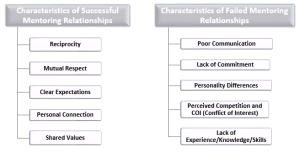Lesson 1. Characteristics of Successful and Failed Mentoring Relationships

Examination of the characteristics of successful and failed mentoring relationship will help both the mentor and mentee develop and gain personal insight on the aspects to follow and to avoid in their own communication. Research by Straus, Johnson, Marquez and Fieldman (2013) revealed 5 characteristics of both successful and failed mentoring relationships.

Features of successful and failed mentoring relationships serve as a guide for mentors and mentees to build a healthy mentoring relationship and collaborate with maximum productivity and harmony. Characteristics of the failed mentoring relationships should be avoided whereas the features of the successful relationships should be adopted.
Here are 5 steps to overcoming the challenges that may arise during the construction of a healthy mentoring relationship and which are related to the characteristics of successful and failed relationships.
- Build Rapport: Sharing ground between mentors and mentees will enhance the quality of the communication and sharing in the relationship. By doing so, Mutual Respect, Personal Connection and Shared Values aspects will be developed.
- Discuss Expectations: At the beginning of the mentoring relationship, it would always be a good idea to share and clarify what both parties want and expect from this relationship. By doing so, Poor Communication, Lack of Commitment, will be avoided.
- Create an Agreement: Negotiate ways in which you will respect each other’s time, needs, boundaries and differences. By doing so, Poor Communication, Lack of Commitment, Personality Differences, Perceived Competition, will be avoided.
- Understand mentoring is a two-way street: In the process of mentoring, both parties should be developed and grown. By doing so, Mentor’s Lack of Experience and Reciprocity aspects are relevant.
- Schedule a Review: Having conversations about what you’ve achieved, what’s working well and what you’d prefer to do differently, after a few meetings, empowers both parties’ commitment to the mentoring relationship. If it is not working well, it allows you to seek additional support, guidance or resources or exit the relationship without fault or failure.
